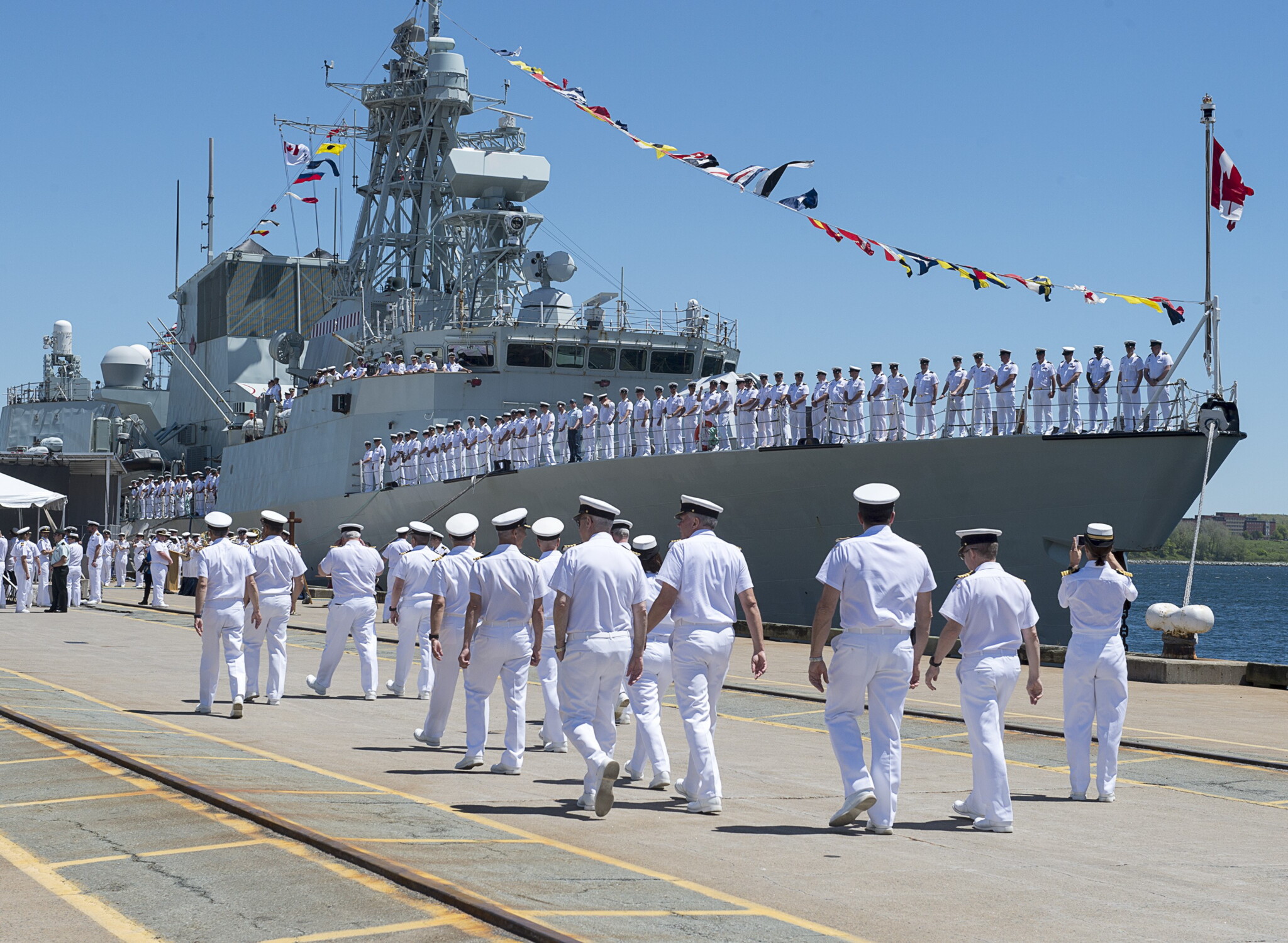So the Royal Canadian Navy is to get a new official march past. The Globe and Mail reported recently that Heart of Oak, which has been the tune to which Canadian sailors have marched for over a century, is to be relegated to the dumpster.
Why? Well, the Navy has decided that “the lyrics, which celebrate British military victories in the colonial era and sing of men but not women, are disrespectful and outdated.” Every time it is played, a naval spokesperson asserted, a “microaggression of exclusion” is heard. And that’s why the song has to go—so the party line has it.
Heart of Oak was composed in 1759, to celebrate what had been a particularly good year for the British in the middle of the Seven Years War, when the British captured Quebec City. The song begins with an exhortation known to countless generations of sailors all over the Commonwealth, “Come cheer up my lads, ‘tis to glory we steer, to add something new to this wonderful year.” In the view of the current Canadian Navy, however, 1759 was “not a glorious year if you were a francophone or many of the Indigenous peoples of Canada.” Because of that, Heart of Oak “does not align with values and ethos of today’s Royal Canadian Navy or the broader Canadian Armed Forces”.
Given that the Navy is grounding its decision in history, let’s talk about that.
Among the 1759 victories celebrated in Heart of Oak is the Battle of the Plains of Abraham, which ended the reign of France in what is now Canada. That is why Canada as we know it today exists. No Plains of Abraham, no British North America. No British North America, no Confederation. And no Confederation, no Canada.
And what exactly happened after the French defeat? Well, four years later at the end of the war, King George III issued the Royal Proclamation of 1763, which recognized Indigenous sovereignty and forbade settlement west of the Appalachians. This ended up being one of the contributing causes of the American Revolution. The American settlers wanted to move west, but the British government wanted to protect the interests of the First Nations inhabitants. We tend nowadays to think only of the Boston Tea Party and Paul Revere, but the proximate causes of the southern rebellion were much more complicated—and they involved efforts by the British to safeguard First Nations interests.
Shortly after that, the British Parliament passed the Quebec Act which ensured that the Francophone population could maintain their language, their Roman Catholic faith, and their legal system.
In other words, the victories of 1759 presaged what we understand today to have been among the very first pieces of modern human rights legislation. We of course will never know what would have happened had we remained part of New France. But the story of the French Revolution and the Reign of Terror doesn’t suggest that it would necessarily have been a happy one.
The other thing that 1759 did was set the scene for Britain to have mastery of the seas. That process wasn’t complete until the Battle of Trafalgar in 1805, but the Battle of Quiberon Bay in November of 1759 was an important part in setting Britain’s maritime strategy leading up to the Napoleonic Wars.
And it was precisely that mastery of the seas that allowed the Royal Navy a generation later to begin to eradicate the slave trade. It is estimated that in the first two-thirds of the 19th century, Britain spent two percent of her GDP on getting rid of slavery—making it, some say, the most expensive moral cause ever fought in human history.
So rather than 1759 being “disrespectful and outdated,” and not consistent with “Canadian values,” I’d have thought that they were causes that we would be proud to be associated with. Protecting human rights, recognizing Indigenous ownership, and eradicating slavery—if those aren’t things worthy of glory by association, then I don’t know what is.
Now none of this is to say that the 18th century was a perfect time. Of course it wasn’t. And the people involved in the battles of 1759—being humans—were flawed. Many of the views they held would be anathema to us. But for that matter, so would many of the views held by the men who went over the top at Vimy Ridge or who went ashore on D-Day be horrifying to us in the comfort of our 21st-century lives. Yet because those who came before didn’t think or act like us, does that mean we have to spit in their faces? As I sometimes ask law students, do you have to hate your grandparents just because you think differently from them? For that is what the tone of the Navy’s description of Heart of Oak is—a smug and self-important assertion that we are better than them. And I for one don’t think we are.
Moreover, the Navy’s thinking begs the question, what makes something “Canadian” enough? Almost every aspect of our system of government: parliament, the common law, the independence of the judiciary—indeed the organization and structure of our armed forces—comes directly as an inheritance from Great Britain. Moreover, all were developed at a time when racism, sexism, and other social ills abounded. Does that mean that they are all tainted? Do we need to ditch parliamentary government because it existed in Britain for half a millennium before slavery was abolished? Does that make it somehow “inconsistent with Canadian values”? That would be a ridiculous proposition. Yet it is the very same analysis that underlies the Navy’s determination to get rid of Heart of Oak.
I know this will upset some in the higher echelons of the Canadian Armed Forces, but the Navy deserves better than this kind of shallow reading of history. It also represents a complete misreading of the room. Think about what the public has seen and heard of the Navy and the Armed Forces in recent years: repeated sexual misconduct scandals, a contaminated drinking water system in our brand-new ships, the fact that we apparently don’t negotiate anything longer than a year’s warranty on our new ships, the fact that we have sailors living in their cars and in tents because they can’t afford housing, the fact that our closest allies form a new strategic grouping and choose not to invite us, our ships not taking part in important NATO deployments, and so on and so on.
The Navy’s public response is to worry about “microaggressions” in a song that has been its official march past for over a century? Seriously? That’s the face that the RCN wants to present to the tax-paying public of Canada?
The naval PR apparatus is of course able to parse this all out and to explain how none of the bad news stories are connected. But fairly or not, that’s not how public opinion works. And in a democracy, without favourable public opinion, the Navy might as well shut off the lights tomorrow.










